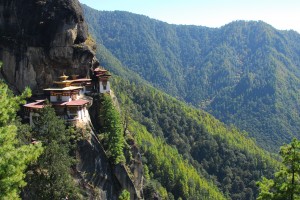In Eric Weiner’s book Geography of Bliss, the author travels to various countries in pursuit of finding a paradise, a place to be happy. He writes about his adventures in a humorous way, making his travels truly engaging. He thinks that the recipe for paradise is that the place must be difficult to reach and there must be a distinction between paradise and ordinary life. I can’t help but agree with him, as most humans are happy when having more than their neighbors. One of those countries visited was Bhutan, where instead of giving the Gross Domestic Product (GDP) importance, they focus more on the Gross National Happiness (a term coined by Bhutan’s king).
Bhutan, full of beautiful mountain views, people live a simple life. There is only one main road, and only recently do they have television. They are a poor country, where you may run into some dead people and face your own mortality. This makes the author depressed, but the natives agree that facing their mortality makes them happier as they’re not as afraid of death. They have a firm believe in religion and reincarnation, on luck and deities in lakes. It is a strange place, but one where some people are able to find happiness by appreciating what they have.
At the end of the trip, he found he had become attached to that little known country, as well as his sometimes annoying but well-meaning guide. He concludes by saying that he would not have done anything differently in hbis life and every step in his life (negative or positive) has been just right. He knows he is okay, and while okay is not happiness, it is a start he is grateful for. Life is a journey of up’s and down’s, but if I manage to be okay for most of it, then I’ll be more than happy with my life.

No comments:
Post a Comment